Here’s a question I hear from many people and newbie traders: “What is an OTC?”
The stock market is full of thousands of different stocks. So before I answer “what is an OTC,” let me point something out…
Imagine if someone knew the outcome of each ticker by the market close … millionaires would be a dime a dozen.
The reality is no one knows what the stock market will do. Least of all you. It’s nothing personal. That’s just the nature of the stock market.
Investment firms spend millions of dollars a year to sniff out profits. But even with the most sophisticated scanners, the biggest names on Wall Street are still just guessing. And they’re mostly trading large-cap listed stocks that only move a few percentage points every day.
To see any account growth, firms purchase shares with millions of dollars. That’s one reason why it’s so hard for the average trader to make money with some stocks — minimal percentage gains.
It’s likely you don’t have millions at your disposal to start trading. That may be why you’re looking for an answer to the question “What is an OTC?”
I started with roughly $12,000 of bar mitzvah money in large-caps. Then watched my account fluctuate a few percentage points. That was before I discovered volatile penny stocks. It was boring and my account was headed nowhere fast.
I learned that it’s not feasible to grow a small account quickly trading large-cap listed stocks.
Competing against investment firms for small percent gains wasn’t sustainable for me. The market was too saturated and I was at too much of a disadvantage.
So what’s the everyday trader to do? Enter the OTC markets.
Table of Contents
What Is an OTC?

Over-the-counter (OTC) stocks don’t trade on big exchanges like the NYSE or Nasdaq. That means they’re less regulated.
Many OTC stocks trade for $5 a share or less — yep, we’re in penny stock land.
The OTC market is made up of a lot of companies — many with little to no revenues. These companies want to raise money by selling stock shares but don’t meet the SEC’s standards. That’s how many end up on the OTC markets. Or sometimes a company doesn’t want to pay the fees to list on a major exchange.
An OTC stock doesn’t usually represent a thriving business. Often their only real revenue comes from selling stock.
The OTC market is essentially a conglomeration of thousands of dumpster-fire companies.
Few penny stocks go on to find success. Remember that. There’s a lot of sketchy dealings in this niche. These stocks and the companies behind them are usually garbage. I certainly would never trust them…
But I’ve made over $7 million* trading these dumpster fires for over two decades.
It’s not easy. Most traders lose. You have to go in educated and prepared.
Anything can happen in the OTC market. That’s why my rule #1 is to always cut losses quickly. Seasoned traders understand that losing is part of trading.
And the top millionaire traders from my Trading Challenge and I know that it takes countless hours, months, and years of studying and dedication to learn this niche.*
Think you’re up for my Trading Challenge? Apply to find out if you make the cut. Once you’re in, you’ll have the opportunity to learn from an amazing chat room, all my DVDs, and much more.
For everyone asking this is the https://t.co/occ8wKmlgm chatroom with all the best traders I know. We weed out allll the BS & laziness hence why you have to apply for access. People with shitty attitudes have offered me $50,000+ to join I said no, zero tolerance for BS these days https://t.co/6cdKVnKje5
— Timothy Sykes (@timothysykes) March 31, 2021
You can learn to trade OTCs, but you must know the essentials first…
What Is an OTC? Volatility!
This is what I love about OTC stocks … They can potentially spike hundreds of percentage points within a day with the right catalyst. That can make it easier to grow a small account — if you’re educated, experienced, and prepared.
Most people are taught to invest in listed stocks because they’re safer.
The problem is that many listed stocks only move a few percentage points every day. There’s far less opportunity for a trader with a small account.
When someone asks you, “What is an OTC?”, you should think of volatility. Here are a few examples of OTC volatility…
What Is an OTC? Example #1: Sysorex Inc. (OTCQB: SYSX)
Sysorex Inc. (OTCQB: SYSX) rose from just above $2 to $15 on April 14 — a 500% morning spike. Check out the chart…
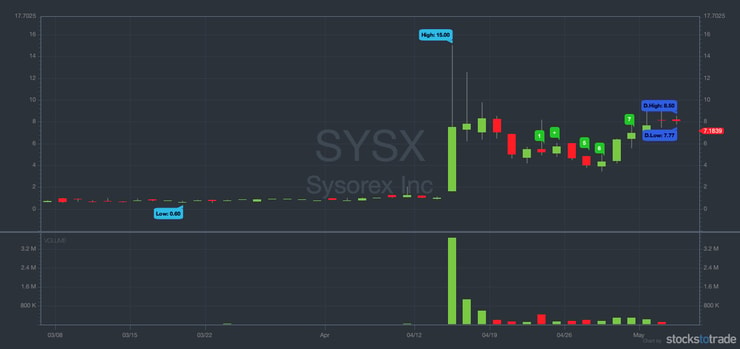
What Is an OTC? Example #2: Genethera Inc. (OTCPK: GTHR)
Genethera Inc. (OTCPK: GTHR) surged from below 10 cents to 40 cents before 10 a.m. Eastern on April 6. Another morning spiker that increased 700% in less than two hours.
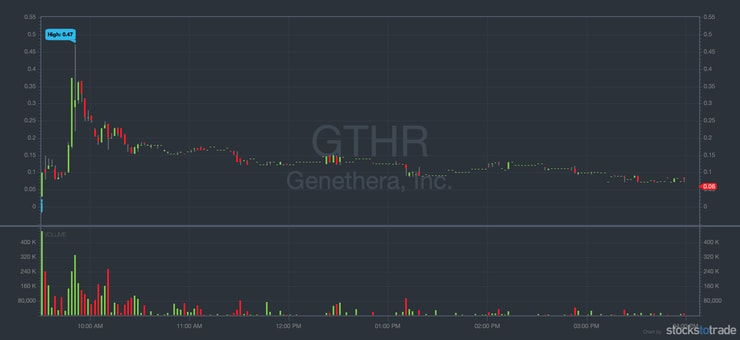
This is the potential of trading OTCs with a short-term strategy. Look at how fast these stocks spike then fall back. Preparation is everything. It takes a lot of practice. Learning to trade them requires patience, preparation, and discipline.
My top students all spent years of dedicated studying, day after day, to learn how to play these massive spikers. Risk management is key.
Buying a massive percentage gainer is more difficult than you think. These stocks can drop at any time. That’s why I trade like a sniper. I aim to get in and out as quickly and safely as possible.
But know that volatility is a double-edged sword. If you’re not careful, it can cut you. It happens to all traders. Anyone who claims it doesn’t is lying.
The ones with the smallest cuts stay in the game.
More Breaking News
- JetBlue Airways Expands Horizons: Is It Set To Soar Or Stall?
- Archer Aviation’s Unexpected Surge: What’s Fueling the Takeoff?
- How Nano Nuclear Energy’s New Acquisition is Powering a Stock Surge
What Is an OTC? Informational Inefficiency
A healthy larger-cap listed company generally has a lot going on. It has news regularly, and traders and investors buy its stock based on its perceived ability to succeed.
OTC stocks are NOT like listed stocks.
Remember the dumpster fire — no revenues, few or no employees, frequent shifts in its business focus.
These companies rarely get press coverage. There are many reasons for that, but one big factor is that a lot of these companies don’t actually do anything.
But then suddenly, they can issue a press release out of nowhere. So say a junk company announces a big government contract. It’s the first anyone has heard of this company, and it’s trading at $1.02…
Lots of inexperienced newbies pounce without even thinking, “what is an OTC?”
Buy orders start flying in, getting filled at higher and higher prices. That results in some junk OTC having a massive first green day. That’s great for prepared day traders.
And these stocks can run multiple days. That makes for plenty of opportunities to trade safely, with a plan.
The longer it takes for the news to get out, the longer the stock could run. But you must know that eventually, the stock will fall back down. Especially with OTC stocks whose companies aren’t worth anything to begin with. See why I LOVE OTC informational inefficiencies here.
What Is an OTC? Opportunity for Small-Account Traders

Remember, these are penny stocks. And because these stocks are more affordable I think they can be great for traders with small accounts. Again, you have to come in educated, prepared, and disciplined.
For the last 20+ years, I’ve learned to spot the patterns and promotions that help me profit in this niche. I use that knowledge to my advantage and now pass on everything I know to my students.
Too many people think they can trade these stocks for a quick million. That’s the wrong attitude.
Remember this: small gains add up over time. I say it again and again. That’s the key to trading these stocks. All the top Trading Challenge traders spent years of studying before reaching big trading milestones.
I’ve spent over two decades trading and I still take small gains. It’s how I trade while teaching the process to students. It’s how I can show what’s possible in this niche.
Most traders lose money. Aim to take small gains while minimizing your losses. It sounds easy, but I promise it isn’t. These stocks can drop fast — you must be prepared to cut losses fast.
If I don’t like the way a stock moves I’ll get out. Sometimes a few minutes later it does what I wanted. Had I held I would have made money…
That’s OK. I trade scared so trading isn’t scary…
I know the next play is right around the corner. I stay safe and protect my gains. If I’m right about a stock and maybe just a little early, I can use that trade to be better prepared for next time.
What Is an OTC Stock Promoter?
Stock promoters hype junk OTCs. Want to trade OTCs like I do? You must understand pumps and promotions.
For most of these OTC companies, the only goal is to boost the stock price and sell shares at inflated prices. That’s how most of these companies generate revenue. The stock promoter’s job is to rally buyers. Too often, those buyers are unsuspecting newbies who believe the hype … “This one’s really going to the moon!”
It’s not. OTC companies pay promoters with money and or stock shares to pump up the stock price.
Back in the day promoters used boiler rooms to promise big gains to uneducated investors. They’d lure more and more buyers. Then as the stock’s price was pumped up, promoters sold into the buying strength at wildly inflated prices.
Once they ran out of stock to sell, promoters stopped pumping the stock. Investors were left with nothing.
Those firms don’t exist in that form today but promoters are still at it.
They’ve moved to chat rooms and Twitter, feeding lies and nonsense to newbies and anyone who’ll listen.
I don’t approve of anyone taking advantage of newbies. But I recognize the powerful role stock promoters play in the OTC markets. Without those greedy coke heads, OTC stocks would have more difficulty moving.
As long as there is an OTC market, there will be promoters.
If you or someone you know is a stock promoter, please contact my team so that we can send them an edible arrangement. Too much cocaine is a bad thing. Promoters could do their jobs better if they consumed more vital nutrients.
Healthier lifestyle changes are in order. The healthier the promoter, the better the promotion, which means larger potential profits for every dedicated trader.
What Is an OTC? The Bottom Line
The stock market industry is corrupt and filled with deception — the OTC market especially.
There’s crazy potential — and plenty of danger. The bright side is I think nearly anyone can learn to trade OTC pumps with rules, discipline, and risk management. It’s part of what I teach in my Trading Challenge.
You don’t have to be perfect. I win about 70% of the time. And I often exit trades too early leaving potential profits on the table.
Aim to take singles. Small gains add up over time. You can see that from my Profit.ly page where I share all my trades.
Learn the process and how to trade safe. Greed can take out even the best traders if they don’t keep their trading emotions in check.
The key is to study hard and stay disciplined. That’s how you can better control losses and take advantage of big percent gainers.
A great place to start is the 30-Day Bootcamp I made with my millionaire student Matt Monaco before he reached $1 million in trading profits.* Take time to learn every day. The Bootcamp is a jumpstart into the mindset you need to learn how to trade OTCs and more.
What do you think? Have you traded OTCs before? Let me know what you think of these volatile and risky stocks by commenting below!
Disclaimer
*This level of successful trading is not typical and does not reflect the experience of the majority of individuals using the services and products offered on this website. From January 1, 2020, to December 31, 2020, typical users of the products and services offered by this website reported earning, on average, an estimated $49.91 in profit.
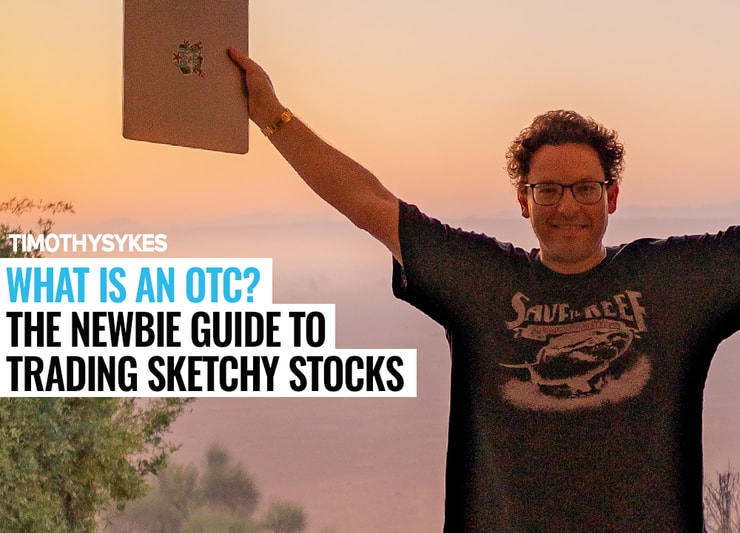

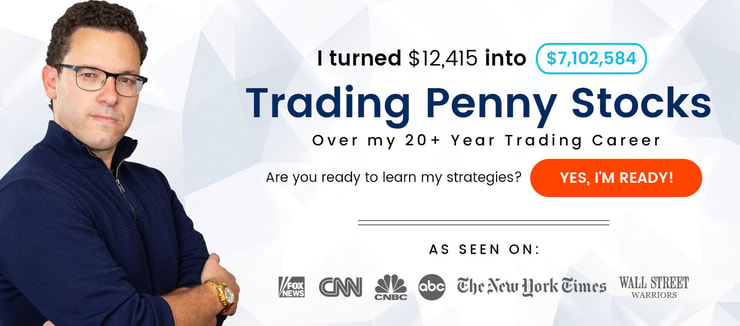
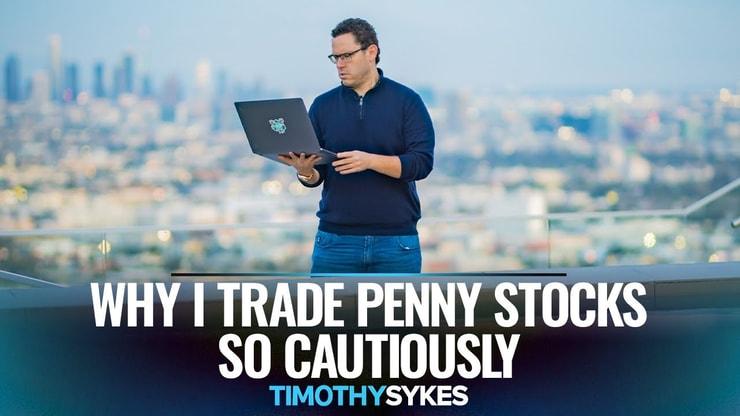
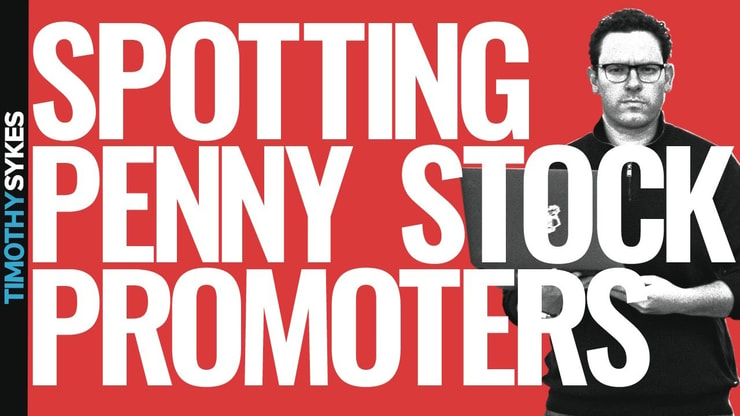

Leave a reply